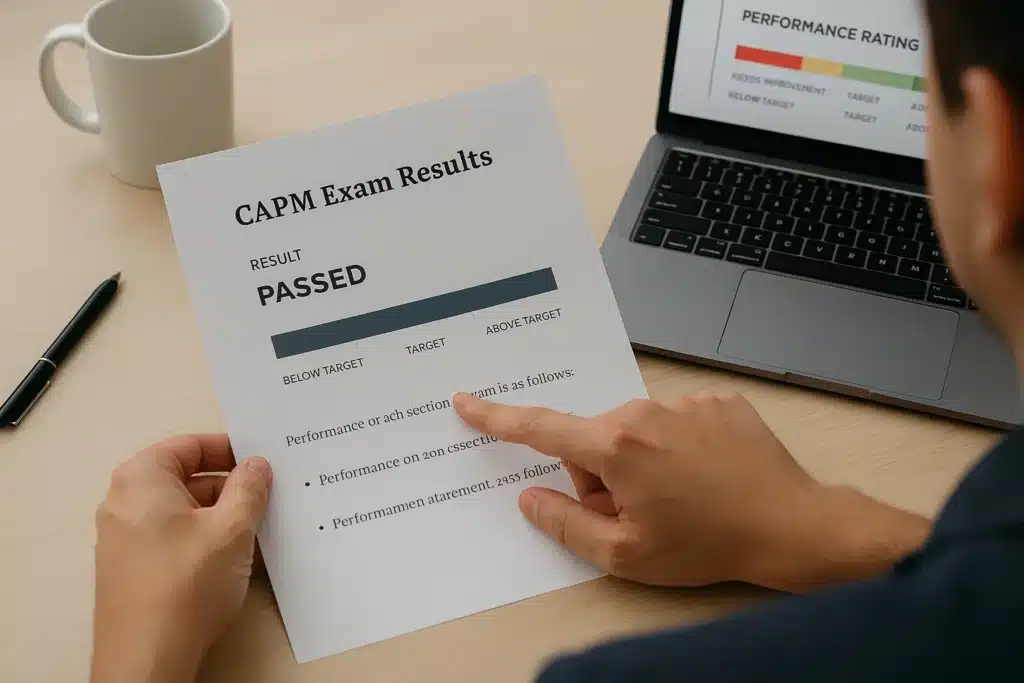CAPM Passing Score Explained: How PMI Determines Your Results
By Ryan Cezar Malaluan, CAPM®; Editor: Geram Lompon; Reviewed by: Alvin Villanueva, PMP®, PMI-ACP®
Have you ever walked out of an exam wondering not just how you did, but how your final score will actually be calculated? If you’re preparing for the CAPM certification exam, that uncertainty can feel even more stressful. You put in the hours, you studied the material—but how does the
Here’s the thing: unlike many other exams, PMI doesn’t publish a fixed CAPM passing score. Instead, they use a scaled system that evaluates your performance across different domains. That means your results aren’t just about a single percentage—it’s about how consistently you demonstrate
Understanding this can take a lot of weight off your shoulders. Once you understand what PMI is actually measuring, you can prepare more effectively, manage your expectations, and enter the testing center with greater confidence.
In this post, we’ll break down exactly how the CAPM exam passing score works, why PMI structures it this way, and what it means for your study strategy. By the end, you’ll know not just how the results are determined, but also how to use this knowledge to improve your chances of success.
The Evolution of CAPM Exam Scoring and Certification Standards
When the CAPM was first introduced, many believed it worked like a traditional test: answer enough multiple choice questions correctly, and you pass. Over time, however, PMI shifted to a more sophisticated approach. They wanted a system that measured not just memorization but also how well candidates could apply project management concepts from the PMBOK Guide and other
To achieve this, PMI adopted psychometric analysis. In simple terms, this method evaluates the difficulty of each question and balances results across the entire examination. That way, two project managers taking slightly different sets of pretest questions can still be measured fairly.
Today, your overall score isn’t reported as a raw percentage. Instead, PMI presents results in performance categories like Above Target, Target, Needs Improvement, and Below Target. This system provides you with more context—it shows not just whether you pass, but also where your strengths and weaknesses lie.
This evolution reflects a broader trend in certification exams. It’s no longer about memorizing every detail—it’s about demonstrating the kind of balanced, practical skills that will serve you well as a certified associate in project management.
How PMI Calculates the CAPM Exam Passing Score
At the heart of the CAPM certification is PMI’s scoring model, which combines several important elements. Think of it less like a simple math test and more like a balanced evaluation of your knowledge.
Here’s what makes up the scoring system:
- Scaled Scoring – Your raw score (the number of practice questions you answer correctly) is converted into a scaled score that accounts for difficulty.
- Domain Weighting – Each domain (People, Process, and Business Environment) carries a specific weight. Strong performance in one area can’t completely make up for weakness in another.
- Performance Categories – Instead of showing percentages, PMI reports how you performed across domains using categories like Above Target, Target, and so on.
- Equating – PMI ensures fairness by adjusting for the fact that not every actual exam form is the same in difficulty.
Put together, these elements create a system that’s fair, consistent, and transparent. You don’t need to worry that your first attempt was “harder” or “easier” than someone else’s—the scaling process balances it out.
For details on exam policies and scoring, you can also review the official PMI Certification Handbook.
The big takeaway? It’s not about memorizing a “passing percentage.” It’s about showing consistent project management body knowledge across all domains.
Why the Project Management Institute Uses Scaled Scoring
It may feel frustrating at first not knowing the exact passing score. But once you see PMI’s reasoning, it makes sense—and works in your favor.
Here are some key benefits of PMI’s scoring system:
- Fairness Across Exams – Different PMI exam versions can’t disadvantage you.
- Focus on Competency – The emphasis shifts from rote memorization to real understanding.
- Actionable Feedback – Performance categories highlight where you’re strong and where you need improvement.
- Industry Credibility – A psychometrically validated scoring system adds credibility to your CAPM certificate.
This approach ensures that passing the CAPM exam truly means you’ve demonstrated well-rounded knowledge of
Take, for instance, a candidate who aces the People and Process domains but struggles in the Business Environment. The feedback they receive pinpoints that gap, giving them a clear roadmap for improvement—even beyond CAPM preparation.
Common Challenges with the CAPM Certification Exam Passing Score
Of course, no system is perfect, and PMI’s scoring approach comes with its own challenges. It’s worth being honest about them so you can stay organized with realistic expectations.
Some common drawbacks include:
- Lack of Transparency – Without a fixed benchmark for CAPM certification requirements, it’s harder to verify readiness.
- Uncertainty for Test-Takers – Candidates often feel anxious, not knowing how many answers they need to “get right.”
- Difficulty Interpreting Results – Performance categories are helpful, but they don’t always show how close you were to the most important part—the passing line.
- Study Strategy Confusion – Without a clear point to aim for, some learners struggle to plan effectively.
That said, many of these concerns come from misconceptions. For example, some candidates believe they must score “Above Target” in all domains to pass the CAPM exam, which isn’t true. Others underestimate the importance of consistency across various domains.
So what can you do? Here are a few strategies:
- Focus on balanced CAPM training across all domains, not just your strongest.
- Use mock exams and practice questions to build familiarity with the format rather than focusing on achieving a specific score.
- Treat performance categories as learning guides rather than final judgments.
Remember, your goal is not just to pass the exam—it’s to build a foundation of basic knowledge you’ll carry into your career.
How to Prepare for the CAPM Exam and Achieve the Required Passing Score
Now that you know how PMI structures the CAPM passing score, it’s time to put that insight into action. Preparing with this system in mind makes your study process more strategic and less stressful.
Here’s a step-by-step approach you can use:
- Review the CAPM Handbook and Exam Content Outline (ECO). Break down your study plan by domain weight.
- Take Mock Exams. Use them to gauge consistency across all domains, not just the overall score.
- Analyze Performance by Domain. Look for patterns in your results and adjust your preparation accordingly.
- Simulate Exam Conditions. Practice under three hours with realistic multiple-choice questions to build confidence.
- Refine Weak Areas. Focus your review on the categories where you scored lower.
A few extra tips:
- Start small and build momentum over time.
- Don’t be afraid to experiment—trial and error is part of the process.
- Involve peers or mentors if you’re struggling with specific concepts.
- Celebrate small wins along the way.
You’ll also benefit from tools like:
- PMI membership resources and the latest edition of the PMBOK Guide
- Third-party practice simulators that replicate the actual exam
- Flashcards and apps to prepare daily
The most important thing? Start now, even if your preparation isn’t perfect. Building steady habits beats last-minute cramming every time.
The Future of CAPM Certification and Exam Scoring Methods
Certification exams don’t stay static. As project management evolves, so does the way PMI evaluates candidates. That means the CAPM exam passing score system may continue to shift.
Here are a few trends to watch for:
- More Adaptive Testing – Future PMI exams may adjust difficulty based on your responses.
- Enhanced Feedback Reports – Expect more detailed breakdowns of your performance.
- Stronger Emphasis on Agile and Hybrid Practices – As these methods evolve, scoring may reflect changes in the domain.
- Digital Integration – Online proctoring and data-driven analytics could refine how results are delivered.
These shifts could have big implications. For example, adaptive testing may mean no two PMP tests or CAPM exams are ever alike, but your score is measured with even greater accuracy.
Potential impacts include:
- For Candidates – More personalized testing experiences.
- For Employers – Greater confidence in certified associate and PMP certification holders.
- For PMI – Stronger credibility in a rapidly evolving industry.
Staying aware of these changes means you’ll never be caught off guard—and you can prepare with the future in mind.
Key Takeaways on CAPM Certification Requirements and Exam Success
We’ve covered a lot today: how the CAPM exam passing score evolved, how PMI determines results, the benefits and challenges of their system, and how you can prepare smarter with this education in hand.
Here are the big takeaways:
- PMI uses a scaled scoring system, not a fixed percentage of minimum requirements.
- Your results are reported in performance categories across domains.
- The key to success is balanced training—not just excelling in one area.
Understanding this doesn’t just help you pass. It gives you a more confident, grounded way to approach your CAPM certificate, your associate in
So, are you ready for your next try? Review your study plan, align it with PMI’s scoring system, and start building consistency across all domains. The more strategic your approach, the better your final score will be.
Final Thoughts: CAPM Passing Score and Your Project Management Journey
At the end of the day, the CAPM certification isn’t just about a passing score—it’s about proving to yourself (and future employers) that you’re ready to step into the world of projects with confidence. Knowing how the scoring works removes the guesswork and puts you in control.
If you’re looking to keep learning and growing, here are a few directions you can take:
- Explore other project management professional tools and study methods.
- Share what you’ve learned with your peers or study group.
- Dive deeper into PMI’s resources for candidates.
- Apply one new strategy in your study routine this week.
We’d love to hear from you—what about the CAPM passing score surprised you the most? And how are you adjusting your preparation strategy? Drop your thoughts in the comments, and let’s keep the conversation going.
Thanks for spending this time with us. Until next time, stay focused, keep learning, and trust yourself—you’ve got this.
References
Invensis Learning. (n.d.). CAPM certification exam format. Invensis Learning. Retrieved September 15, 2025, from https://www.invensislearning.com/info/capm-certification-exam-format
PMI. (n.d.). Certified Associate in
PMI. (2022). Certification handbook.
Sangshetti, F. (2023, October 25). CAPM exam passing score. PM Study Circle. https://pmstudycircle.com/capm-exam-passing-score/

